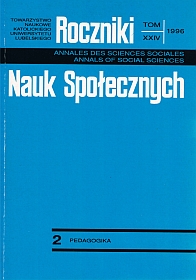For a Pedagogy Sensible to Person and to a Fellowship of Persons
Abstract
Contemporary educative thinking and action is differentiated to a considerable extent. We find in it a lack of clarity of the situation and a multitude of suggested solutions. The need to act and take up decision about education is stronger than before. The more we feel a need for a scientific pedagogy, a pedagogy based on firm philosophical and anthropological foundations.
The pedagogy of personalism, being one of the more lively contemporary trends in education, contributes essentially to the development of such pedagogy. This line underwent a dynamic development in many countries (especially in Italy, Spain, France, and, partly, in Germany). It is said to be a kind of perenne personalism, or personalism of our time. Recently the concept has been linked with E. Mounier and his friend, gathered around the paper „Esprit”. This line of pedagogy had its advocates in Poland before and after World War Two. There was no lack of educators who even during the officially approved pedagogy of regime system in the Polish Peoples Republic conducted the educative activity understood in a personalistic manner.
Can we say that personalism is current today?
On the one hand, we experience a disapproval to it, and this is linked with the great systems of the past (modernism), among which personalism is included too. On the other hand, along with the development of post-modernist tendencies there is an increased opposition and fear of irrationality. Moreover, the practice of everyday life points out that the tendency towards, what one may call, personalistic and communitarian revolution increases. This is often called a personalistic return. This phenomenon of a personalistic return, present in the teaching of the Pope (among other in Centesimus annus, 1991), calls for an interpretation in the province of theoretical pedagogy, as well as some responses towards tendencies in a concrete life. These responses should deal with efforts for the sake of the creation of a pedagogy by the standards of a persons and community of persons. The measures which are suggested here are the following: tending towards a creative development of a person’s potential in freedom, taking into consideration the relationships which occur between relations the educative system and the democratization of social life, manifesting the attitudes of dialogue and sensitivity to the person and the community of persons, showing some dose of moral courage and engagement, manifested in being vigilant to statements and tendencies, which appear in pedagogy, and for the sake of the defence of person’s rights and dignity.
Copyright (c) 1996 Roczniki Nauk Społecznych

This work is licensed under a Creative Commons Attribution-NonCommercial-NoDerivatives 4.0 International License.


